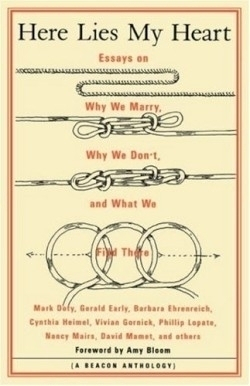Here Lies My Heart
Essays on Why We Marry Why We Don't and What We Find There
Defenders of the institution will be relieved; more than half of the twenty essays in Here Lies My Heart muse about why people marry, instead of why they don’t. What most of these essayists say, however, is not likely to encourage those contemplating entering into a permanent “we” state of being. The relationships both male and female authors write of are characterized far more by hurt, breached trusts and resentment both inflicted and felt than by contentment, intimacy and happy endings.
These things are not inherently bad; negative experiences can often be more instructive than positive ones. Unfortunately, only a few of the authors write so that the reader may learn. Louise DeSalvo’s “Adultery” is one. As candid as the title, this first-person essay starts with the discovery of her husband’s affair. That discovery causes her to frankly examine changes in herself since marriage. “I buried my spirited self and became staid and settled…though it seemed he was unfaithful, paradoxically, he was faithful. To the spirit of the woman he married, to the kind of union he had imagined.” DeSalvo reclaimed her lost self, and suggests readers honor adulterous impulses—not necessarily by acting on them—but by paying attention to what they say about the status quo. It is a most unselfish, original take on a situation that typically follows one of two scripts: shipping out angrily or sticking it out miserably.
Other standouts for original angles or lessons left with readers are Gerald Early’s “Monogamy and Its Perils” and Mark Doty’s “An Exile’s Psalm.” Early discusses how race can pressure a marriage: “No one yearned more than I to fulfill the duties of being a father and husband; to show the world-both black and white-that I, as a black man, was not the moral failure so many supposed me to be.” Writing from a woman’s perspective, Doty’s essay explores his protagonist’s emotions over the death of her first love, and how they affect her relationship with his successor: “I found myself in love and in grief simultaneously, which is no easy place to be.”
Many of the other essays are tales of particular circumstances and experiences that do not seem to apply beyond the author, and do not answer the questions the title claims. Still, these essays are intriguing, entertaining and well-written.
Reviewed by
Cari Noga
Disclosure: This article is not an endorsement, but a review. The publisher of this book provided free copies of the book to have their book reviewed by a professional reviewer. No fee was paid by the publisher for this review. Foreword Reviews only recommends books that we love. Foreword Magazine, Inc. is disclosing this in accordance with the Federal Trade Commission’s 16 CFR, Part 255.

